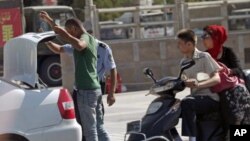Courts in China have sentenced to death four members of the Uighur minority ethnic group following deadly attacks in the country's restive Xinjiang region.
China was quick to defend the death sentences handed down the four men found guilty on Tuesday of murder, arson and running a terrorist organization following the bloody unrest in restive Xinjiang in July.
Two other Uighur nationals were jailed for 19 years for their roles in the separate incidents in Kashgar and Hotan.
Trial questioned
International rights groups claim the four men had been tortured into making confessions and were denied lawyers. Government spokeswoman Jiang Yu refuted the claims, saying the suspects were tried fairly and deserved the harsh punishment.
China will continue to use the law to unswervingly crack down on separatist and terrorists, Jiang said. She added the law is being used to safeguard China's national security, development and the unity of all Chinese whatever their ethnicity in the region.
Beijing says the attacks were organized by Uighur extremists seeking an independent Islamic state called East Turkestan.
Ethnic tensions spark unrest
Xinjiang has seen several violent attacks in recent months that authorities blame on extremists. In mid July, a polic station was attacked by a mob in Hotan, leaving 15 people dead.
Another 15 people were killed in Kashgar in an explosion and when a truck driven by some of the men slammed into pedestrians, who were mostly Han Chinese settlers. Two Uighurs were shot dead by armed Chinese riot police.
It was the worst violence Xinjiang since the 2009 race riots in regional capital, Urumqi. At that time, clashes between majority Han Chinese and Uighurs killed nearly 200 people, most of them Han.
Terrorist charges
Uighur exile groups say they have been economically and culturally repressed in their homeland by a growing influx of Chinese settlers. China claims Uighur extremists are working with al-Qaida and other militant groups, but has yet to produce evidence of such links. Beijing has beefed up security to tighten its grip on the resource rich territory.
And, it is seeking the extradition of scores of Uighurs from its Asian neighbors including Pakistan, Malaysia and Cambodia. Beijing says most are being sought for human trafficking crimes.
But international rights groups claim this is just an excuse and that China is handing over development cash in exchange for people it fears are terrorists.
Jiang did not offer further details on the security arrangements.
The United Nations Human Rights Council in Asia declined to comment.











